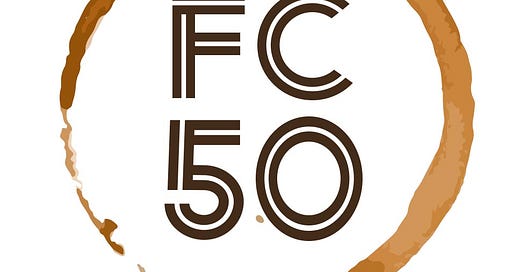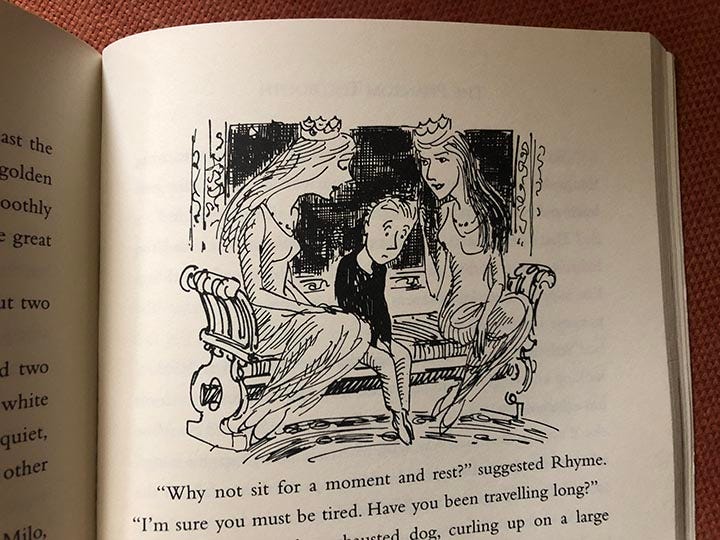Dear Readers,
Thank you for your enthusiastic response to 🔗 FC #49 on ‘Disagreement’.
Rajesh Bagga, a dear friend in Delhi, points out that what appears to be a disagreement could dissipate if both parties have something in common to gain and are willing to make acceptable compromises.
My friend Nataraj had a disagreement with the university where he was lecturing and gave up that job to become a dedicated legal professional and there has been no looking back for him since then. He makes the point that at times disagreement should have a fallback position.
Abraham Thomas says: Disagreement reminds me of a Paraprosdokian* "If I agreed with you, we'd both be wrong."
[*In Greek it means “against expectations”, and typically puts the first part of the sentence in a new and humorous context. For example; "Behind every great man there's a woman, rolling her eyes." OR "Where there's a will, I want to be in it."].
Shall we look at a few interesting things that happened on June 13th?
On June 13th 1920, the US Post Office issued an order which said children cannot be sent by parcel post (after various instances of people mailing children by affixing a 15p stamp on their dress and handing them over at the post office). The ingenious parents found that it was cheap and safe to mail their kids to grandparents since ‘parcel service’ had no restrictions. The fact that the postmen were reliable and honest made this an attractive proposition.
For the Cricket buffs: the first official T-20 match was played on 13th June 2003. The match between Hampshire and Sussex was shown live on television at 5 pm.
I want to take a minute to mention Anne Marie Frank, who was born on June 12, 1929. She was given a diary on June 12th 1942, her 13th birthday when she and her family were hiding from the Nazis. She wrote on the first page as if addressing her diary:
“I hope I shall be able to confide in you completely, as I have never been able to do in anyone before, and I hope that you will be a great support and comfort to me.”
Anne's diary from June 1942 to August 1944 is regarded as the most famous personal account of the Holocaust and has been made into a play and film. Betrayed, Anne and her family were sent to concentration camps where Anne later died from Typhus. To know more, I strongly recommend that you take a virtual visit to Anne Frank’s House in Amsterdam using this link: 🔗 Who was Anne Frank?
FC #50 marks the Golden Jubilee of my newsletter. Let me recap how it all started.
Way back in April 2020 when the first wave altered our lives leaving us socially and professionally ‘crippled’, I wondered how I might put the time on my hands to sensible use. My son Abhay, my daughter Kanchana and my wife Geetha were united in asking me to undertake writing and now, one year later, I have, with all the good wishes and encouragement of my readers, reached this milestone.
I am very grateful to all of you. If any of you wish to read any of my previous editions please 🔗 click here. Additionally, 🔗 FC 25 links to a summary of FC 01 to FC 24.
Rhyme or Reason
All of us have come across this phrase in one context or another. Together these words mean ‘common sense’, ‘good sense’ or ‘reason’. What intrigues me is that this phrase is seldom used in a positive connotation. For example, I have not heard someone saying ‘rhyme or reason prevailed’. Instead what you hear is ‘good sense or common sense’ prevailed.
I have always wondered why this phrase is used in a negative connotation — “He got angry for no rhyme or reason” or “She had no rhyme or reason for what she did.” Even if you questioned someone, you would ask, “Was there any rhyme or reason to do what you did?”
It is also interesting to note that ‘rhyme’ is used in conjunction with ‘reason’ whereas reason is capable of being used as a standalone word. So, in the example above, you can say “He got angry for no reason” but you can’t say “He got angry for no rhyme”!
In another instance, when you use the word ‘prevail’ you could say ‘good sense prevailed’ or ‘hope common sense prevails’. But you can’t do the same with ‘rhyme’. You can’t say “hope rhyme prevails’. If you asked me why not, I could only say “you can’t use ‘rhyme’ without ‘reason’. 😉
So, what is the origin of this phrase? Some say it dates back to the early 15th century. The likely explanation is that it originated as a French expression for bad poetry. The French would say that the poetry was "sans rime ni raison'': which literally meant — "without rhyme or reason.'' Many educated English speakers of past centuries who were also fluent in French simply borrowed the translated version of the phrase ‘without rhyme or reason’ and integrated it into English.
The Phantom Tollbooth is a children's fantasy adventure novel written by Norton Jester. Very briefly, it is a story about a young boy named Milo who unexpectedly receives a magic tollbooth (which meant he could go anywhere without having to pay a toll). Milo drives through the tollbooth in his toy car, transporting himself to the Kingdom of Wisdom. He discovers that two of its princesses named Rhyme and Reason had been banished by their brothers to a Castle in the Air.
So Milo, with the help of two faithful companions, a dog named Tock and the Humbug, restores the kingdom to its exiled princesses. It is a kind of story that underscores the importance of undoing something that was done without rhyme or reason. You can get the book online and may like to check out the movie by the same title.
How would you look at rhyme and reason as two distinct words? Reason is simple enough to comprehend. Anything supported by reason would seem acceptable. Reason, therefore, could be more prosaic in its usage whereas rhyme is more poetic in its use. A well-reasoned article would keep you engaged but, as the French say, if poetry has no rhyme it may not appeal to the reader.
Rhyme is said to help quick recall. You may find it easy to memorise a poem quicker than you would a paragraph of prose. The nursery rhymes that we were taught in primary schools are ageless, whether it be ‘Jack and Jill’ or ‘Hickory Dickory Dock’. The sing-song rendition makes these rhymes easier to remember. So, rhyme could be a good reason that something is easy to recall.
Many advertisements use rhymes in jingles or a tagline to showcase the brand and product for this very reason. Like, ‘jo bibi se kare pyar, woh Prestige se kaise kare inkar’
Rhyme-as-Reason Effect is considered as a cognitive bias in Psychology. It is believed that rhymes can influence minds. Apparently, this occurred in the O J Simpson trial when the jury was told that a pair of gloves found at the crime scene did not fit the accused Simpson’s hands. His lawyer, John Cochran, exclaimed “If it doesn’t fit, you must acquit”. This reason rhymed as well and perhaps swayed the verdict in Simpson’s favour.
There are some impressive ‘public interest messages’ that are etched in our memory. For example these traffic messages: “It is better to be late than be called Mr Late” | “Beware you overtaker, for I am the undertaker”.
Impressing on the need to memorise the lines in a play, the Director tells the wannabe actor, “When you are on the stage, be on the same page”. Advice not easy to forget.
All of these go to show that rhyme itself could be a good reason to drive home a point.
Now, please put up with the poet in me. I am going to present a message in rhyme composed just for you!
This virus called Covid
Has made our imagination horridA normal sneeze
Makes you freezeA touch of fever
Makes you teeterWhen you can't taste,
You ping the GP post-hasteWhen you can't smell,
Mind rings alarm bellsIf your attitude is positive
With gratitude, you remain negative.
Please take good care of yourself. The lockdown has been extended for a good reason — and also for a good rhyme: health is wealth. Cheers!








I hadn't thought of 52. Thank you. It could be the anniversary edition! OMG. Thank you Amba.
While I was aware (as most are) of Anne Frank, I was particularly enamored when I learned from your FC of what she wrote on the first page of her diary, especially considering her particular situation. It was also interesting to learn of how you started writing. I agree on your term of milestone for that is what FC #50 is and I am sure there will be several more in store ahead.
I am very impressed to know of the origin of the phrase Rhyme or Reason and also to know of the connection it has to a Children’s book. Your knowledge in these things astound me. Yes rhymes aids recall. I am aware that many still use a rhyme, that we learned in our school day,s to recall (at least when in doubt) the days of the month that goes something like this “30 days of September, April, June….” Even some little children learn ABC by learning a song.
Trust you to come out with a poem on Covid. You way with words never ceases to amaze me. I liked the way you connected the lockdown extension to good rhyme and reason. That, to me, is an example of positive connotation in the use of the phrase!